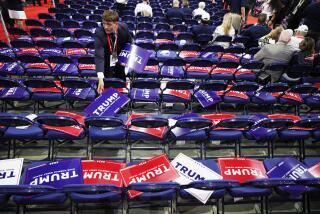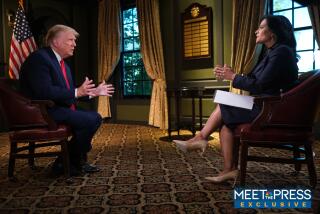Rivals About Even : Presidential Race Enters Final Phase
- Share via
WASHINGTON — The prolonged struggle for the presidency opens its final phase today with Democrat Michael S. Dukakis battling to regain the initiative and the high ground from his suddenly resurgent Republican foe, George Bush.
At the traditional Labor Day starting point, public and private polls show that Bush has pulled just about even with Dukakis. Strategists on both sides attribute this shift to public response to the vice president’s impressive acceptance speech at the New Orleans convention last month and to the withering attack mounted by Republicans against Dukakis in recent weeks.
Republicans Jubilant
Because Bush had trailed the Massachusetts governor in the polls for most of the summer, often by double-digit margins, Republicans are naturally jubilant over the change.
“From top to bottom, from the candidate down to the volunteer campaign staff, no one here anticipated that we would look as good as we do before Labor Day,” Bush campaign manager Lee Atwater said. “Our goal was to be (only) 8 to 10 points behind.”
In addition to an increase in Bush’s positive ratings in the polls, due to his unexpectedly strong convention speech, Bush partisans contend that they observed a jump in Dukakis’ negatives as a result of their firing away at his record.
They were particularly pleased by their success in provoking Dukakis into responding to the implied accusation that he was deficient in patriotism because he had vetoed a bill requiring Massachusetts public school teachers to lead students daily in the Pledge of Allegiance, thus lending weight to the charge.
“That was our Exocet missile. We just sank that ship--pow!” one Bush strategist exulted. The strategist predicted “a sustained effort to portray Dukakis as someone who is really outside the American mainstream.”
For their part, Dukakis’ managers argued that much of the ground they lost was merely a result of the inevitable “bounce” in popularity that Republicans received from their convention.
Nevertheless, they vowed that their candidate would not soon again make the mistake of putting himself on the defensive--as Dukakis did in the flag pledge controversy--by responding to what they contend are frivolous allegations raised by the Bush campaign.
Instead, they said, Dukakis would strive to turn attention back to the topic that had served him so well earlier in the campaign--what Democrats refer to as “unevenness” and “sluggishness” in the much-heralded economic recovery.
“We have to stay on the offensive,” Dukakis pollster and senior strategist Tom Kiley said. “We have to show the American people what we mean by prosperity, what we mean by investing in the future.”
“We have a clear idea of where this race is going to be run,” said Dukakis’ communications director, Leslie Dach. “It’s on economic issues.”
Today, appropriately enough in Detroit, the traditional heart of the Democratic Party’s trade union base, Dukakis will announce a broad new economic theme: “Bring prosperity home--home to the middle class, and home to America.”
Double-Edged Slogan
The slogan, Dach explained, has a double edge: It highlights Dukakis’ contentions that middle-class Americans have not kept up with upper-income groups in the Reagan years and that the United States has fallen behind other countries in international economic competition.
Indeed, Dukakis intends to rest a good part of his foreign policy arguments on his economic themes, his aides say.
“I think this election will be more about the economy than foreign policy, but I think these two will run together much more than they have in the past,” said pollster Kiley, who contends that this approach suits the national mood. “Public opinion seems more focused on economic challenges that face the country and the threat they represent,” he argues, than on military threats.
In seeking to execute their competing strategies, both candidates face a common problem--an apathetic electorate.
White House pollster Richard B. Wirthlin reported that only 19% of the voters questioned in a recent survey said that they had talked about the presidential campaign at all, much less given serious thought to the merits of the opposing candidates.
Attitudes about the election tend to be amorphous and ambiguous. “They were looking for change,” said Mark Rovner of the Roosevelt Center for American Policy Studies, about the attitude of swing voters who took part in a recent “focus group” organized by the nonpartisan think tank. “But they weren’t sure how much change they wanted.”
“Voters don’t feel much involvement in the campaign,” said Democratic pollster Mark Mellman, who advised Tennessee Sen. Albert Gore Jr.’s Democratic presidential campaign. “Much of what happens slides right past them.”
In part, this lack of interest reflects the relative national state of well-being. In this country, it usually takes bad news--war or economic upheaval--to build great interest in politics.
Also contributing to the general uninterest are the political personae of Bush and Dukakis. One Reagan Administration official, a veteran of political wars, calls them both “C-plus candidates,” lacking in intellectual and personal vitality.
Neither candidate, critics say, has offered voters clear and realistic solutions to such fundamental problems confronting the country as the huge twin deficits--in the federal budget and the balance of trade.
Democrat Dukakis presents himself as a sort of “Gov. Goodwrench.” What he has to offer, as he emphasized in his acceptance speech, is not “ideology” but “competence.”
“Dukakis gives no warmth, no smell,” complained Richard Williamson, a former Reagan campaign aide who is an unofficial adviser to the Bush campaign.
But, if Dukakis is perceived as dull, Democrats argue that Bush is still not much more than an ill-defined vice presidential blur who has yet to show he can use the foundation of his much-lauded acceptance speech to carve out a clear political identity.
For these and other reasons, Atwater, Bush’s campaign manager, believes the attention span of the electorate is strikingly short this year, no more than five to seven weeks. “I think what is important is who has control of the agenda for the last five or seven weeks, who is on the offense and who is on the defense,” he said. “We plan to be on offense.”
So does the Dukakis campaign. And, starting today, on Labor Day--when Dukakis will campaign in the East and Midwest and address an outdoor rally in the Motor City’s Hart Plaza, and Bush will campaign in Southern California and join in a send-off for Olympic athletes at Disneyland--each will be maneuvering to dominate debate in the climactic period ahead.
Based on interviews with professionals in both camps, here is what the strategic agenda looks like for each contender:
These are Bush’s priorities:
--Stress Reagan’s accomplishment. His advisers regard the Reagan era’s peace and prosperity as Bush’s greatest assets. “The more important that peace and prosperity become, the better it is for George Bush,” Atwater says.
Because some parts of the country are less prosperous than others, peace is probably a stronger card for Bush than the economy. Another reason for this is that defense and foreign policy are generally viewed as Dukakis’ weak points, because of his lack of experience in those areas.
The potential problem for Bush is that the emphasis on Reagan’s record could interfere with Bush’s efforts to establish his own identity. In addition, the linkage to Reagan makes Bush vulnerable to criticism over such Reagan Administration fiascoes as the Iran-Contra and the Pentagon scandals.
--Target Dukakis’ record. By focusing on half a dozen or so aspects of Dukakis’ gubernatorial record--such as his veto of the bill requiring the Pledge of Allegiance, his opposition to capital punishment, his one-time support for weekend passes for convicted murderers--Bush strategists believe they can define him as the sort of liberal Democratic candidate whom they have easily beaten in the past.
“We think Dukakis has been deceitful,” Bush campaign research director James Pinkerton said. “And what we think he has been deceitful about is that he is too liberal for the country.”
But the danger is that Bush’s attacks on his adversary might irritate voters weary of negative campaigning. GOP consultant David Keene warns, furthermore, that the attacks on Dukakis’ past probably will lose punch unless Dukakis himself provides fresher ammunition.
--Offer something new. “He (Bush) needs something to hang a vote on, something to give the press something to write about,” one Bush strategist said.
Bush has tried, with his tax-credit program to finance child care and last week with an ambitious agenda for cleaning up the environment. “I think he has already been more innovative than his opponent,” campaign manager Atwater said.
But some Republicans wonder whether proposals in such fields as social welfare and the environment will help Bush much because most of the organized groups that pay attention to such issues lean heavily to the Democrats.
Here is Dukakis’ strategic agenda:
--Define change. In the early polls, Dukakis benefited from the hazy feeling among voters that they wanted some sort of change. But now, some voters appear to feel that Bush offers them as much change as they want, the Roosevelt Center’s Rovner said. He recalled the positive reaction of the center’s focus group, watching on television, when Bush in his acceptance speech suggested that “when you have to change horses in midstream, doesn’t it make sense to switch to one who’s going the same way?”
“That line really had impact,” Rovner said.
If Dukakis is to get the voters to switch from the GOP elephant to the Democratic donkey, some analysts feel, he will have to be more specific than he has been in the past. “We will provide more details about some of these problems,” communications director Dach promised. But doing that goes against Dukakis’ inherent caution. And he knows one thing for certain: Whatever he says, the Republicans will certainly use it against him.
--Defuse the GOP attacks. The best policy in most cases, Dukakis aides argue, is simply for him to ignore the charges.
“I don’t think you can try to defend against every new charge the Republicans come up with,” pollster Kiley said. “We have to press our own case. We have to press our own agenda.”
Another Dukakis gambit is to give Bush a dose of his own medicine by attacking him--as Dukakis did last week when he derided Bush’s role in the Iran-Contra affair in scathing terms. “These are not tactics Michael Dukakis is unfamiliar with,” said Kiley of the Bush campaign barrage. “Massachusetts has a reputation for being a pretty contentious political environment.”
--Avoid internal disputes. Aides to former Dukakis rival Jesse Jackson picked last week, when the Dukakis campaign was more beleaguered than at any time since spring, to let it be known that Jackson was unhappy with his campaign role. The aides contended that Dukakis strategists wanted Jackson to limit his appearances in states where it was judged that he might do more harm than good.
The episode was a reminder that the problem that Jackson has posed from the beginning of the Democratic presidential campaign has not gone away.
Dukakis will have to persuade Jackson to accept his designated role in the Democratic campaign, and do so in a way that does not cost Dukakis support among conservative Reagan Democrats or Jews. Leaders of some Jewish groups served notice at the GOP convention in New Orleans that they were concerned about Jackson’s influence in the party and in the councils of the Dukakis campaign.
More to Read
Get the L.A. Times Politics newsletter
Deeply reported insights into legislation, politics and policy from Sacramento, Washington and beyond. In your inbox twice per week.
You may occasionally receive promotional content from the Los Angeles Times.










